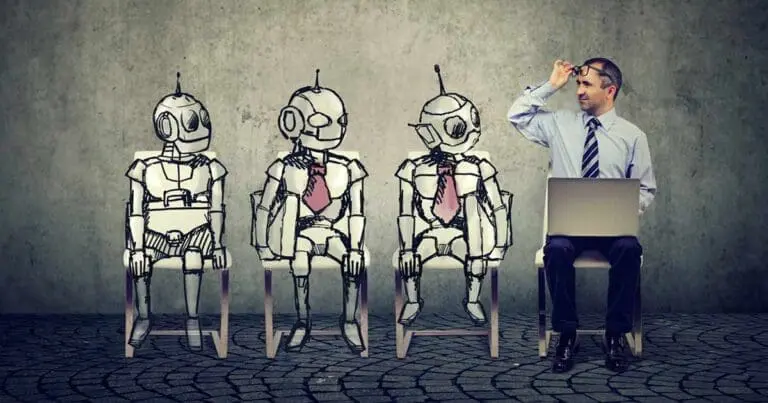The Future of Work: How to Offset AI Job Automation

Technological advancements throughout history have led to massive disruptions in the workforce before.
Think of the invention or discovery of the printing press, electricity, planes, and the Internet.
These were heralded as the end of specific trades and professions as we knew them, yet as a society, we adapted, survived, and eventually thrived.
Today, the new, perceived “threat” is Artificial Intelligence, or AI as we know it best. But this advancement doesn’t necessitate a negative connotation.
The ability to offset AI job automation is possible. Here’s how.
5 ways to offset AI job automation
Consider strategies like embracing new AI technology, investing in AI training, and prioritizing soft skills to ensure you and your workers are still employable in the age of AI.
- Embrace new AI technology
- Invest in AI training and re-skilling
- Embrace a growth mindset to offset AI job automation
- Prioritize soft skills to offset AI job automation
- Continue to create new jobs to offset AI job automation
1. Embrace new AI technology
Before you think that AI job automation won’t impact your industry, think again.
Computers are already starting to outperform humans in complex roles like medicine, law, accounting, journalism, cybersecurity, and even aviation—and we’re likely just scratching the surface of what’s possible.
The employees you value will be impacted by the continued enhancement of AI capabilities.
2. Invest in AI training and re-skilling
First up is investing in new retraining and “up-skilling” programs. Investment in these programs will likely fall on governments and companies themselves.
While some element of job loss will be unavoidable, given McKinsey’s estimate that half of the tasks workers perform today can be automated, it’s crucial to think of this job loss as the loss of specific tasks, rather than the jobs themselves.
Retasking employees away from tedious tasks that computers can more effectively complete to tasks that require innate human traits or those which AI has yet to overtake will be crucial in improving the efficiency of your business while enhancing the results of more top-level tasks AI is currently unable to complete.
To enable employees to transition away from the remedial or daily tasks they are trained in, you’ll need to develop an effective training program.
Surprisingly, this will likely be in the form of AI solutions. Retraining solutions like AI-driven Coaching Networks allow workers to learn what they need through AI augmentation without sending them back to school.
3. Embrace a growth mindset to offset AI job automation
Another way to offset AI job automation will come from employees transforming the way they perceive their skills.
Rather than a stagnant skill base produced by traditional education and experience learned on the job, workers will need to view their skills as a portfolio necessitating constant refinement.
In the AI-driven age we are entering, workers will be expected to be continuous learners in order to meet new workforce demands.
While companies will begin to invest in retraining or “up-skill” programs, workers that proactively seek to expand and evolve their skills independently alongside the advancement of AI capabilities will be the most in-demand talent in the years to come.
It’s likely that proactive learning will soon become one of the most in-demand skills companies comb resumes for in the AI, machine learning age.
4. Prioritize soft skills to offset AI job automation
While there is no denying that the advancement of AI means that some tasks will no longer need a human to complete them, it also means that there are innately human traits and skills that AI will never be able to replicate.
Leaning into and nurturing these skills in your employees will make them more valuable to your business.
Things like creativity, abstract thinking, the ability to thrive in diverse environments, communicating, networking, social and emotional intelligence, intercultural sensitivity, public relations, and elements of Digital Marketing are inimitable by a machine.
Despite countless AI advancements, these are the traits that separate humans from machines.
To offset AI job automation and replacement in your company, as well as around the world, it’s critical to recognize the value of these skill sets and the need to hire for and invest in developing them among your employees.
5. Continue to create new jobs to offset AI job automation
Last but not least, the core method of how to offset AI job automation will be the creation of new jobs and industries.
The reason it’s so easy to go the doomsday route when it comes to AI advancement is that envisioning a new industry or career that has never existed is incredibly difficult to do.
It’s like trying to envision what an alien might look like, and why Hollywood often presents beings that look so much like us.
When something has never been exposed to you, it’s impossible to try to imagine it without putting it in the context of what you’ve already seen.
When it comes to the development of new industries created by a newfound reliance on AI, the options are limitless, yet our ability to identify them down is challenging.
Obviously, we’ll need AI Specialists and AI Ethicists.
We’ll see the rise of an industry solely dedicated to the maintenance of AI systems, robots, and products which could result in millions of jobs.
What we’ll also see with AI advancements is the rise of industries that have yet to be imagined.
Similar to how individuals in the early 1800s never could’ve dreamed up the aviation industry, we are in the midst of the invention of industries we can’t yet imagine.
Will AI take over the world?
There is a disparity between when a new technology that automates certain jobs comes out before new jobs for those impacted emerge, to be sure.
But by planning for the inevitable automation of elements of the jobs we all hold today and changing the way we think of AI integration, we can better prepare to offset AI job automation.
Those who will be held most responsible will be the innovative Tech companies that develop and implement these advancements initially.
Ensure your business plans for the current and future state of the local, national, and global workforce by implementing a few forward-thinking strategies to offset AI job automation.
The truth about AI job automation
Regardless of our efforts, we are entering a transitional phase of AI job automation.
Early-on efforts by governments, companies, and individual workers to invest in new skills-building and training programs, change the perception of employee skill sets being evergreen, nurture and more highly value workers’ innate humanness, and imagine and create new industries born out of our growing reliance on AI will be our best bet to offset AI job automation on a local, national, and global level.
If you lack the tech-driven experts you need to integrate and maintain new AI solutions to augment the productivity of your workforce, contact Mondo today. We’ll provide you with the machine learning and AI-driven Tech talent you need to stay ahead of the curve.
Looking to hire top-tier Tech, Digital Marketing, or Creative Talent? We can help.
Every year, Mondo helps to fill over 2,000 open positions nationwide.
More articles about job searching and industry trends:
- 4 Ways Voice Assistants Can Benefit Your Business: Siri, Alexa, Google
- How To Recruit and Hire Machine Learning Engineers
- Top 3 Employee Retention Strategies for Tech Workers
- The Benefits of Hiring Faster: Why Speed is Crucial
- The Top 5 Reasons We Need More Women in Tech
- How to Best Explain Having a ‘Gap’ on Your Resume
- 6 Most In-Demand Tech Skills to Get a Job in 2023
- What Does a Recruiter Do & Who Do They Work For?



